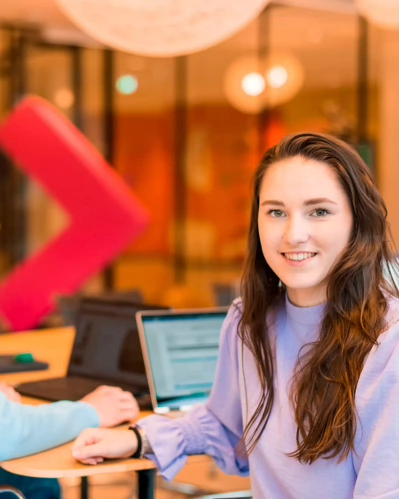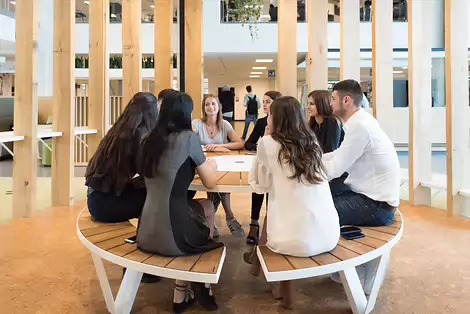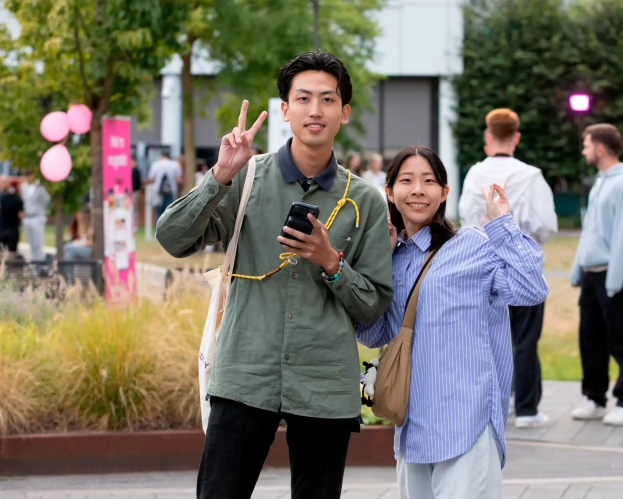
Education in the Netherlands
The Dutch approach
Universities in the Netherlands offer more than 1,150 international course programmes conducted in the English language. As such, our country is the largest supplier of English-language course programmes in continental Europe. The Netherlands has received international acclaim for the groundbreaking Problem-Based Learning, or ‘PBL’ system, that teaches students to analyse and solve real problems independently, through a mix of theory and application, teamwork and self-study and through challenging the self-discipline of the students.
Dutch universities
Higher education in the Netherlands is offered at approximately 55 universities. Two major types of universities can be distinguished, i.e. 'universiteiten' (research universities) and 'hogescholen' (universities of applied sciences). The research universities train students for the independent practice of science and academic research, whereas the universities of applied sciences focus more on the application of knowledge and the direct preparation of students for their professional careers. At the Fontys University of Applied Sciences, we place the emphasis on competency-based education and we are proud to be one of the largest universities of applied sciences in the Netherlands.
Universities of Applied Sciences
In the Netherlands, there are approximately 40 universities of applied sciences and Fontys is one of the largest and best known. Universities of applied sciences offer four-year course programmes, leading to a Bachelor’s degree upon completion of the undergraduate phase and course programmes, leading to a Master’s degree upon completion of the postgraduate phase. The course programmes are designed to target specific domains within the employment market and always include internships and/or work placement periods.

"Studying at Fontys in an international environment"
-
Associate Degree Programme
At Fontys, we offer Associate degree programmes that are taught in Dutch. These programmes are Level 5 on the NLQF/EQF scale. They're designed to get you ready for a job in just 2 years, during which you'll earn 120 ECTS credits.
Admission
You need a Havo diploma or an Mbo diploma at level 4.
After the programme
After finishing, you can go on to a related Bachelor's programme. You can often finish the Bachelor's programme in about 2 years. When you graduate, the Executive Board gives you your degree. If you finish a Bachelor's degree, you would also get a title.
Your diploma
When you graduate, you'll receive an Associate degree.
-
Bachelor's Degree Programme
In the Netherlands, a typical Bachelor’s degree course takes 4 years to complete and involves earning 240 ECTS credits.
Admission
You can join with a Havo diploma, an Mbo diploma (level 4), or a Vwo diploma (level 4+).
What it leads to- The study programme prepares you for a specific career;
- It is rated at NLQF/EQF level 6;
- The degree upon graduation is Bachelor.
Studying after your Bachelor's degreeAfter completing your Bachelor programme, you can go for a Master's degree programme or join a pre-master (bridging programme) at a research university to prepare for a Master's degree. Looking for more specific information? Check out our study programme pages for detailed information about each programme.
Degrees and titlesAfter graduating, the Executive Board awards you a degree. You'll also earn a title with your Bachelor’s degree.
Bachelor's degrees you can earn- Economy: Bachelor of Science, or for Business Administration: Bachelor of Business Administration
- Laws: Bachelor of Laws
- Education: Bachelor of Education
- Engineering: Bachelor of Science
- Healthcare: Bachelor of Science
- Visual Arts: Bachelor of Arts
- Social Studies: Bachelor of Arts

-
Master's Degree Programme
If you're looking to join a Master's degree programme, it's important to understand that you're not automatically guaranteed a spot in any specific Master's programme. You might have to meet certain selection criteria. So, it's really important to think carefully about which Master's programme you choose.
Duration and credits
Master’s Degree programmes last at least 1 year and require 60 ECTS credits. Some Master's degrees take 2, 3, or 4 years, with 90, 120, or 240 credits.
What you'll learn
You'll gain deeper knowledge in a specific profession. Your study will include a thesis or final project focused on practical research. All Master's degree programmes are rated at NLQF/EQF level 7.
More information
Looking for more specific information? Check out our study programme pages for detailed information about each programme.
Degrees and titles
After finishing, the Executive Board gives you your degree. You also get a title with your Master’s degree.
Master’s degrees you can earn- Education: Master of Education
- Healthcare: Master of Science
- Visual Arts: Master of Arts
- Music: Master of Music
- Social Studies: Master of Arts
- Language and Culture: Master of Science
Using your title
You can put 'M' followed by an abbreviation of your degree after your name. For example, Master of Education becomes “M Ed.”

